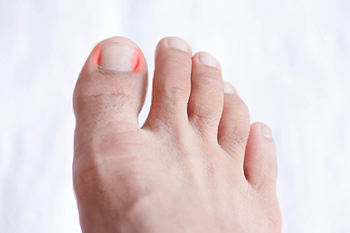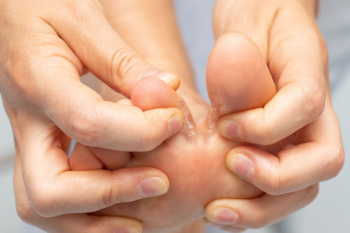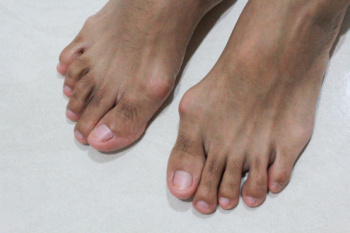
Cellulitis is a bacterial skin infection that affects the deeper layers of the skin and underlying tissue. It occurs when bacteria enter through a break in the skin, leading to redness, swelling, and pain. In the case of the toenails, cellulitis can develop from other infections, such as athlete’s foot or an ingrown toenail. Athlete’s foot causes cracks in the skin between the toes, which can allow bacteria to invade, while an ingrown toenail can lead to infection in the surrounding tissue, causing redness, swelling, and pain. Symptoms of cellulitis in the toenails include warmth, redness, swelling, and tenderness in the affected area. The skin may feel tight and painful, and there may be drainage or pus if the infection worsens. If left untreated, cellulitis can spread and cause serious complications. A podiatrist can treat cellulitis by prescribing antibiotics, draining any abscesses, and addressing the underlying cause, such as treating athlete’s foot or correcting an ingrown toenail. If you are dealing with this condition, it is suggested that you make an appointment with a podiatrist for care.
Ingrown toenails can become painful if they are not treated properly. For more information about ingrown toenails, contact Judson Siegel, DPM of Assabet Family Podiatry. Our doctor can provide the care you need to keep you pain-free and on your feet.
Ingrown Toenails
Ingrown toenails occur when a toenail grows sideways into the bed of the nail, causing pain, swelling, and possibly infection.
Causes
- Bacterial infections
- Improper nail cutting such as cutting it too short or not straight across
- Trauma to the toe, such as stubbing, which causes the nail to grow back irregularly
- Ill-fitting shoes that bunch the toes too close together
- Genetic predisposition
Prevention
Because ingrown toenails are not something found outside of shoe-wearing cultures, going barefoot as often as possible will decrease the likeliness of developing ingrown toenails. Wearing proper fitting shoes and using proper cutting techniques will also help decrease your risk of developing ingrown toenails.
Treatment
Ingrown toenails are a very treatable foot condition. In minor cases, soaking the affected area in salt or antibacterial soaps will not only help with the ingrown nail itself, but also help prevent any infections from occurring. In more severe cases, surgery is an option. In either case, speaking to your podiatrist about this condition will help you get a better understanding of specific treatment options that are right for you.
If you have any questions please feel free to contact our offices located in Plainville, Marlborough, and Somerset, MA . We offer the newest diagnostic and treatment technologies for all your foot and ankle needs.

Athlete’s foot is a common fungal infection that causes discomfort and irritation, typically between the toes. This condition is caused by fungi called dermatophytes, which thrive in warm, moist environments like sweaty shoes and socks. If you have athlete's foot, you may experience intense itching, redness, peeling, and in some cases, blisters or cracks. The feeling can be persistent and frustrating, making it difficult to wear shoes or walk comfortably. There are different types of athlete’s foot. Interdigital athlete's foot affects the space between the toes, while the moccasin type causes dry, scaly patches on the soles and sides of the feet. The infection can easily recur if not treated properly, as the fungi can survive on surfaces like towels, shoes, or floors. Poor hygiene and tight shoes can also contribute. If you are dealing with recurring athlete’s foot, it is suggested that you make an appointment with a podiatrist who can provide effective treatments, including prescribed antifungal medications.
Athlete’s Foot
Athlete’s foot is often an uncomfortable condition to experience. Thankfully, podiatrists specialize in treating athlete’s foot and offer the best treatment options. If you have any questions about athlete’s foot, consult with Judson Siegel, DPM from Assabet Family Podiatry. Our doctor will assess your condition and provide you with quality treatment.
What Is Athlete’s Foot?
Tinea pedis, more commonly known as athlete’s foot, is a non-serious and common fungal infection of the foot. Athlete’s foot is contagious and can be contracted by touching someone who has it or infected surfaces. The most common places contaminated by it are public showers, locker rooms, and swimming pools. Once contracted, it grows on feet that are left inside moist, dark, and warm shoes and socks.
Prevention
The most effective ways to prevent athlete’s foot include:
- Thoroughly washing and drying feet
- Avoid going barefoot in locker rooms and public showers
- Using shower shoes in public showers
- Wearing socks that allow the feet to breathe
- Changing socks and shoes frequently if you sweat a lot
Symptoms
Athlete’s foot initially occurs as a rash between the toes. However, if left undiagnosed, it can spread to the sides and bottom of the feet, toenails, and if touched by hand, the hands themselves. Symptoms include:
- Redness
- Burning
- Itching
- Scaly and peeling skin
Diagnosis and Treatment
Diagnosis is quick and easy. Skin samples will be taken and either viewed under a microscope or sent to a lab for testing. Sometimes, a podiatrist can diagnose it based on simply looking at it. Once confirmed, treatment options include oral and topical antifungal medications.
If you have any questions, please feel free to contact our offices located in Plainville, Marlborough, and Somerset, MA . We offer the newest diagnostic and treatment technologies for all your foot care needs.

A bunion is more than a bump on the side of the foot. It is a misalignment of the joint at the base of the big toe, which can lead to swelling, redness, and persistent pain. Bunions often develop slowly and may be caused by inherited foot structure, arthritis, or wearing tight shoes that crowd the toes. Early treatment focuses on relieving discomfort and slowing the progression of the deformity. Wearing shoes with a wide toe box and using protective pads can reduce pressure and inflammation. Custom orthotics may help correct foot mechanics and ease strain on the joint. In cases where pain interferes with daily activities, surgical options may be considered to realign the toe and restore function. If you are struggling with bunion pain or notice the deformity is worsening, it is suggested that you see a podiatrist for a proper diagnosis and treatment tailored to your needs.
If you are suffering from bunions, contact Judson Siegel, DPM of Assabet Family Podiatry. Our doctor can provide the care you need to keep you pain-free and on your feet.
What Is a Bunion?
A bunion is formed of swollen tissue or an enlargement of boney growth, usually located at the base joint of the toe that connects to the foot. The swelling occurs due to the bones in the big toe shifting inward, which impacts the other toes of the foot. This causes the area around the base of the big toe to become inflamed and painful.
Why Do Bunions Form?
Genetics – Susceptibility to bunions are often hereditary
Stress on the feet – Poorly fitted and uncomfortable footwear that places stress on feet, such as heels, can worsen existing bunions
How Are Bunions Diagnosed?
Doctors often perform two tests – blood tests and x-rays – when trying to diagnose bunions, especially in the early stages of development. Blood tests help determine if the foot pain is being caused by something else, such as arthritis, while x-rays provide a clear picture of your bone structure to your doctor.
How Are Bunions Treated?
- Refrain from wearing heels or similar shoes that cause discomfort
- Select wider shoes that can provide more comfort and reduce pain
- Anti-inflammatory and pain management drugs
- Orthotics or foot inserts
- Surgery
If you have any questions, please feel free to contact our offices located in Plainville, Marlborough, and Somerset, MA . We offer the newest diagnostic and treatment technologies for all your foot care needs.

